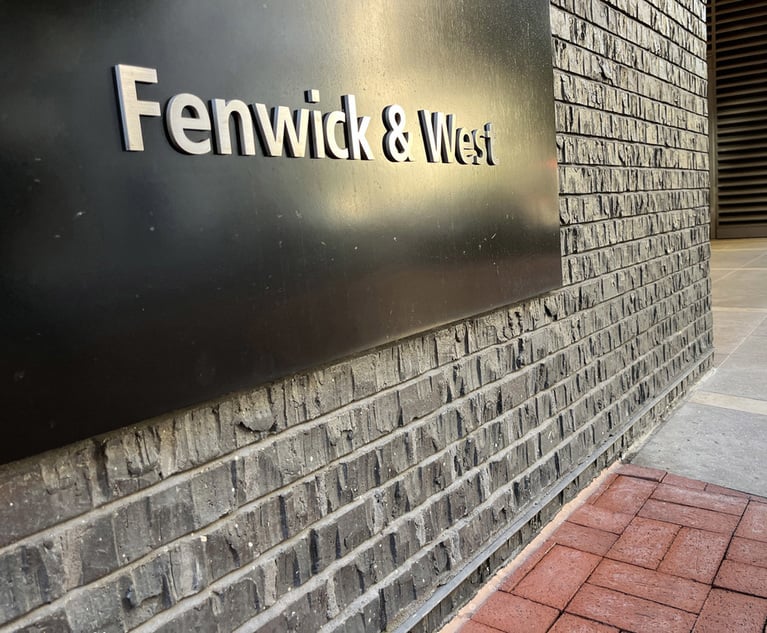Big Law's Value Prop in Smaller Markets: The Morning Minute
The news and analysis you need to start your day.
February 14, 2022 at 06:00 AM
6 minute read

Want to get this daily news briefing by email? Here's the sign-up.
WHAT WE'RE WATCHING
NO SMALL REWARD - Big Law firms in the last few years have launched a flurry of new offices in smaller cities, from Nashville to Austin to Salt Lake City—areas where billing rates are far below those in New York, Washington, D.C., and Los Angeles. So, other than barbecue and live music, what's the attraction? Analysts say the value proposition for law firms, even for some of the most profitable firms that can't command their usual rates in such cities, is simple: enticing talent, being near valuable clients, and adding offices with lower overhead costs. Industry observers told Law.com's Andrew Maloney that there are generally two paths for Am Law 50 firms opening in such markets. One is following high-opportunity startups, which often pay for legal services through alternative fee structures. The other route is more of a talent play: bringing on excellent lawyers who have practices that expand beyond the market or who can help do work outside their region.
LIVE RUST - Many litigators are eager to get back to the courtroom after nearly two years of virtual proceedings. But will trying cases in person, with pants on, after all this time take some getting used to? Attorney Matthew Tharney told Law.com's Charles Toutant that lawyers who have been out of the courtroom for a long time are susceptible to a lack of mental sharpness that he terms "ring rust," which describes a boxer who hasn't fought in awhile. "There is no question in my view that absence from the courtroom for an extended period creates so-called ring rust, particularly with respect to facility with evidential issues in the live courtroom setting when important decisions regarding objections must be made without the luxury of time. Nuances regarding how to present to a jury are also directly implicated in a courtroom setting, such as the layout of the specific courtroom, acoustics, or juror selection, that cannot be ignored, and such issues have not been the subject of focus for many trial lawyers during the pandemic," said Tharney, who is president of the Trial Attorneys of New Jersey, a group devoted to preserving the jury system.
WHO GOT THE WORK?℠ - Here's a cute Valentine's Day love story to kick off your week: budget airlines Frontier Group Holdings Inc., the parent company to Frontier Airlines, and Spirit Airlines are getting hitched and the guest list for the wedding is a who's who of Big Law. Miramar, Florida-based Spirit is represented by a Debevoise & Plimpton team led by partners Gregory Gooding and William Regner. Frontier, which is based in Denver, is advised by Latham & Watkins partners Mark Bekheit and Tony Richmond. O'Melveny & Myers advised both carriers on employment matters. Barclays, acting as financial adviser to Spirit, is represented by Sullivan & Cromwell partner George J. Sampas. Citigroup Global Markets Inc., acting as financial adviser to Frontier, is advised by Fried, Frank, Harris, Shriver & Jacobson partners Philip Richter and Roy Tannenbaum. The transaction, announced Feb. 7, is expected to close in the second half of 2022 and is valued at approximately $6.6 billion, including the assumption of net debt and operating lease liabilities. Read the press release on Law.com Radar and check out the most recent edition of Law.com's Who Got the Work?℠ column to find out which law firms and lawyers are being brought in to handle key cases and close major deals for their clients.
WHO'S WATCHING WHO? - The operator of video and GIF-sharing site Imgur was hit with a class action Friday in California Central District Court alleging violations of the Video Privacy Protection Act. The suit, backed by Bursor & Fisher, centers on Imgur's use of a Facebook tracking pixel to collect information on visitors' views and link it back to individual Facebook profiles. The suit pursues claims on behalf of individuals who have a Facebook account and watched videos on Imgur's site. Counsel have not yet appeared for the defendant. The case is 2:22-cv-00979, Suufi et al v. MediaLab.Ai, Inc. Stay up on the latest deals and litigation with the new Law.com Radar.
EDITOR'S PICKS
WHILE YOU WERE SLEEPING
OMICRON'S STILL ON - The easing of COVID restrictions, while occurring in the U.K. and the U.S., is not taking place everywhere. As Law.com International's Chris Niesche reports, law firms in Australia have pushed back plans to bring more staff back to the office and are requiring those who do go in to wear masks. The change in plans follows a surge in COVID-19 cases that hit Sydney and Melbourne in January. Compared with many other nations, Australia had been more successful in containing the virus for the first two years of the pandemic. But the highly contagious omicron variant spread rapidly through the country, particularly in the two largest cities. By the start of the second week of January, Australia had surpassed 100,000 new cases a day. And while the peak appears to have passed, law firms are delaying plans to more fully repopulate their offices.
WHAT YOU SAID
"You have a lot of lawyers at big, traditional firms who are unhappy. They would like a move to something like a virtual firm, but they were previously apprehensive about it. They always had the marble and mahogany and people all around them taking care of them. COVID thrust them into an environment where they can work from home. People said, 'I can do this. It's great.'"
This content has been archived. It is available through our partners, LexisNexis® and Bloomberg Law.
To view this content, please continue to their sites.
Not a Lexis Subscriber?
Subscribe Now
Not a Bloomberg Law Subscriber?
Subscribe Now
NOT FOR REPRINT
© 2025 ALM Global, LLC, All Rights Reserved. Request academic re-use from www.copyright.com. All other uses, submit a request to [email protected]. For more information visit Asset & Logo Licensing.
You Might Like
View All
Law Firms Close Southern California Offices Amid Devastating Wildfires

Longtime Reed Smith Health Care Partner Opts for Solo Practice Over Retirement
3 minute readLaw Firms Mentioned
Trending Stories
- 1'It's Not Going to Be Pretty': PayPal, Capital One Face Novel Class Actions Over 'Poaching' Commissions Owed Influencers
- 211th Circuit Rejects Trump's Emergency Request as DOJ Prepares to Release Special Counsel's Final Report
- 3Supreme Court Takes Up Challenge to ACA Task Force
- 4'Tragedy of Unspeakable Proportions:' Could Edison, DWP, Face Lawsuits Over LA Wildfires?
- 5Meta Pulls Plug on DEI Programs
Who Got The Work
Michael G. Bongiorno, Andrew Scott Dulberg and Elizabeth E. Driscoll from Wilmer Cutler Pickering Hale and Dorr have stepped in to represent Symbotic Inc., an A.I.-enabled technology platform that focuses on increasing supply chain efficiency, and other defendants in a pending shareholder derivative lawsuit. The case, filed Oct. 2 in Massachusetts District Court by the Brown Law Firm on behalf of Stephen Austen, accuses certain officers and directors of misleading investors in regard to Symbotic's potential for margin growth by failing to disclose that the company was not equipped to timely deploy its systems or manage expenses through project delays. The case, assigned to U.S. District Judge Nathaniel M. Gorton, is 1:24-cv-12522, Austen v. Cohen et al.
Who Got The Work
Edmund Polubinski and Marie Killmond of Davis Polk & Wardwell have entered appearances for data platform software development company MongoDB and other defendants in a pending shareholder derivative lawsuit. The action, filed Oct. 7 in New York Southern District Court by the Brown Law Firm, accuses the company's directors and/or officers of falsely expressing confidence in the company’s restructuring of its sales incentive plan and downplaying the severity of decreases in its upfront commitments. The case is 1:24-cv-07594, Roy v. Ittycheria et al.
Who Got The Work
Amy O. Bruchs and Kurt F. Ellison of Michael Best & Friedrich have entered appearances for Epic Systems Corp. in a pending employment discrimination lawsuit. The suit was filed Sept. 7 in Wisconsin Western District Court by Levine Eisberner LLC and Siri & Glimstad on behalf of a project manager who claims that he was wrongfully terminated after applying for a religious exemption to the defendant's COVID-19 vaccine mandate. The case, assigned to U.S. Magistrate Judge Anita Marie Boor, is 3:24-cv-00630, Secker, Nathan v. Epic Systems Corporation.
Who Got The Work
David X. Sullivan, Thomas J. Finn and Gregory A. Hall from McCarter & English have entered appearances for Sunrun Installation Services in a pending civil rights lawsuit. The complaint was filed Sept. 4 in Connecticut District Court by attorney Robert M. Berke on behalf of former employee George Edward Steins, who was arrested and charged with employing an unregistered home improvement salesperson. The complaint alleges that had Sunrun informed the Connecticut Department of Consumer Protection that the plaintiff's employment had ended in 2017 and that he no longer held Sunrun's home improvement contractor license, he would not have been hit with charges, which were dismissed in May 2024. The case, assigned to U.S. District Judge Jeffrey A. Meyer, is 3:24-cv-01423, Steins v. Sunrun, Inc. et al.
Who Got The Work
Greenberg Traurig shareholder Joshua L. Raskin has entered an appearance for boohoo.com UK Ltd. in a pending patent infringement lawsuit. The suit, filed Sept. 3 in Texas Eastern District Court by Rozier Hardt McDonough on behalf of Alto Dynamics, asserts five patents related to an online shopping platform. The case, assigned to U.S. District Judge Rodney Gilstrap, is 2:24-cv-00719, Alto Dynamics, LLC v. boohoo.com UK Limited.
Featured Firms
Law Offices of Gary Martin Hays & Associates, P.C.
(470) 294-1674
Law Offices of Mark E. Salomone
(857) 444-6468
Smith & Hassler
(713) 739-1250










